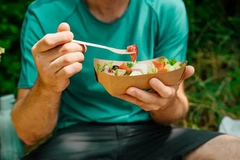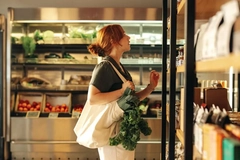
With the European summer of 2003 as hot as any in recent memory, Feldschloesschen Brewery of Braunschweig, Germany, was anticipating sizable growth in beer sales. High-volume discounters looked especially promising. These chains—with names like Aldi, Rewe, and Plus—sell 16% of all packaged beer in Germany, and Feldschloesschen in the recent past has been successful with canned beer sold through these discounters.

With the European summer of 2003 as hot as any in recent memory, Feldschloesschen Brewery of Braunschweig, Germany, was anticipating sizable growth in beer sales. High-volume discounters looked especially promising. These chains—with names like Aldi, Rewe, and Plus—sell 16% of all packaged beer in Germany, and Feldschloesschen in the recent past has been successful with canned beer sold through these discounters. But Feldschloesschen’s dreams of increased can sales were rudely interrupted by the German government. Because it was determined in late 2002 that fewer than 72% of beer, soft drinks, and mineral waters sold in Germany were packaged in refillable containers, the German government enacted in January of 2003 a mandatory deposit of 0.25 EUR (US $0.32) on every nonrefillable beer, soft drink, or mineral water container in the marketplace. By the end of the month, consumers were dutifully returning their cans and bottles to retail stores to get their deposits back. As these retailers suddenly found themselves having to deal with thousands of dripping, unsanitary beer cans formerly collected at the consumer’s curbside, they stopped carrying canned beer altogether. This was bad news indeed for Feldschloesschen. “Sales of beer in cans went down nearly 80% in Germany,” says Feldschloesschen director Klaus Schuberth. “We had a big capacity for cans, and we were hit hard.” So Feldschloesschen and parent company Holsten Brewery AG invested 7 million EUR (US $9 million) in a shiny new turnkey line from Krones that is built for blowing and in-line filling of 500-mL nonrefillable multilayer barrier PET bottles. Brown preforms weighing 28g are supplied chiefly by Amcor PET Packaging. Retailers prefer the PET beer bottles over nonrefillable glass and cans because, as long as consumers put the threaded closure back on, the bottles are more sanitary. Added advantages over glass include light weight and shatter resistance. On top of all that, the recyclability of PET is thoroughly proven and well established. Having decided that a PET bottle was the future for nonrefillable beer containers, Holsten still had to make a decision about what kind of barrier component the bottle should have. Visit www.amcor.com for more information.With the European summer of 2003 as hot as any in recent memory, Feldschloesschen Brewery of Braunschweig, Germany, was anticipating sizable growth in beer sales. High-volume discounters looked especially promising. These chains—with names like Aldi, Rewe, and Plus—sell 16% of all packaged beer in Germany, and Feldschloesschen in the recent past has been successful with canned beer sold through these discounters. But Feldschloesschen’s dreams of increased can sales were rudely interrupted by the German government. Because it was determined in late 2002 that fewer than 72% of beer, soft drinks, and mineral waters sold in Germany were packaged in refillable containers, the German government enacted in January of 2003 a mandatory deposit of 0.25 EUR (US $0.32) on every nonrefillable beer, soft drink, or mineral water container in the marketplace. By the end of the month, consumers were dutifully returning their cans and bottles to retail stores to get their deposits back. As these retailers suddenly found themselves having to deal with thousands of dripping, unsanitary beer cans formerly collected at the consumer’s curbside, they stopped carrying canned beer altogether. This was bad news indeed for Feldschloesschen. “Sales of beer in cans went down nearly 80% in Germany,” says Feldschloesschen director Klaus Schuberth. “We had a big capacity for cans, and we were hit hard.” So Feldschloesschen and parent company Holsten Brewery AG invested 7 million EUR (US $9 million) in a shiny new turnkey line from Krones that is built for blowing and in-line filling of 500-mL nonrefillable multilayer barrier PET bottles. Brown preforms weighing 28g are supplied chiefly by Amcor PET Packaging. Retailers prefer the PET beer bottles over nonrefillable glass and cans because, as long as consumers put the threaded closure back on, the bottles are more sanitary. Added advantages over glass include light weight and shatter resistance. On top of all that, the recyclability of PET is thoroughly proven and well established. Having decided that a PET bottle was the future for nonrefillable beer containers, Holsten still had to make a decision about what kind of barrier component the bottle should have.












